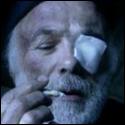- Z. Autobahn
- Jul 20, 2004
-

colonel tigh more like colonel high
|
Just because Hedrigall asked, I'll crosspost my analysis of PSS from the "Unforgivable Endings" thread...
Z. Autobahn posted:
More thoughts regarding the ending of Perdido Street Station:
I think the ending is definitely jarring, but in many ways crucial to what the book is trying to say. On a fundamental level, the novel is about justice, or more specifically, injustice, the fallibility of the idea of justice; nearly every page has some form of institutionalized injustice, some perverted understanding of the idea of retribrution, whether it's the Remade or the Garuda understanding or the abuses of the militia or the fact that Motley is allowed to operate with full impunity, etc. It's not just the simple anti-establishment raging of a lot of fantasy; in many ways, I think, Mieville is questioning the very idea of institutionalized "justice" as anything but a means of oppression, and sees collective individual understanding as the only alternative; let's not forget that Mieville is also a fairly prominent Marxist thinker. It's important to remember that just about everything that goes wrong in the book is the direct result of Isaac's actions, whether it's through carelessness (the slakemoth) or moral justification (the sacrifice of the innocent old man). This is not to say that Isaac is a villain, but simply that he is, at the outset of the book, a purely individualistic character, driven by his own pursuits and desires, with little consideration for others; he pays lip service to social justice, but does not really do anything about it. He invents world-changing technologies with little consideration for precisely how they will change the world (just think of what the New Crobuzon authorities would do with his crisis engine once they got their hands on it!). So in a sense, his decision at the end has less to do with the nature of rape (I have no doubt if Yag had said up front "I raped someone", Isaac would've still helped him) or about the trauma that seeing Lin destroyed has had on him (though of course, that was a main part), as it is about Isaac submitting himself to the justice of another, to seeing that it is fundamentally not his place to judge whether Yag should or should not fly, that he is merely one facet of a complex and dangerous social matrix and humbly accepting the limitations of his own judgment and vision. Hence the title, "Perdido Street Station": the nexus of the social matrix of the city.
In short, Mieville's a total commie, and the book is about the end of individualist thinking and the birth of social consciousness and awareness. You might not be crazy about it, but to suggest the ending "comes out of nowhere" misses the central arc of the story.
|
 #
¿
Feb 23, 2009 00:47
#
¿
Feb 23, 2009 00:47
|
|
- Adbot
-
ADBOT LOVES YOU
|

|
|
#
¿
May 5, 2024 06:58
|
|

